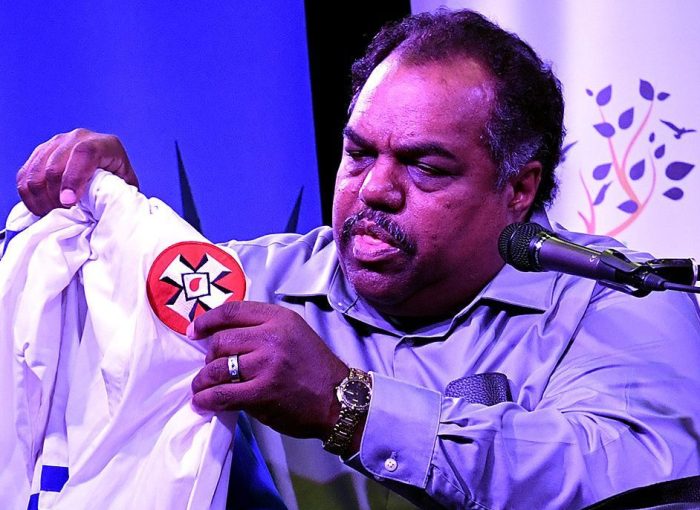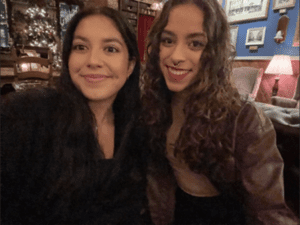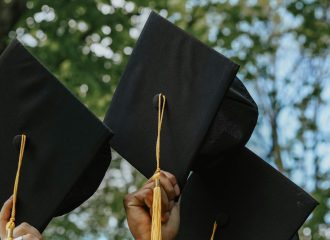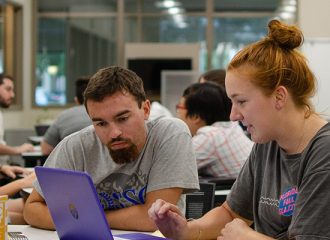by Jeannie Reyes
When prompted to think about a friendship that I was able to build despite differences, I think of my best friend Kelly.
Kelly and I met in August of 2023 at the beginning of the fall semester. She’d approached me in our Communication Theory class to ask if I wanted to work with her on an assignment where group work was optional. I declined. I figured working alone would be more efficient. I would have never thought that, almost a year down the line, she would become one of the closest people to me.
Her attendance and participation in our class was something I couldn’t leave unacknowledged. I noticed how punctual and organized she was, and how almost everything she owned was pink. Although we were complete opposites, I silently applauded her for all of it until, one day, the applause started coming from her towards me.
Later in Communication Theory, she complimented the way I took notes and asked why I used Google Docs instead of Microsoft Word. I showed her more of the lesser-known features Docs offered, like pressing Command + } to quickly indent. She was amazed, which intrigued me because I couldn’t believe someone was finding Google Docs note-taking methods as interesting as did.
That interaction was the start of something amazing. Sitting with each other in class, doing group work together wherever possible, sharing notes, and hanging out to eat or study together before and after class became my new normal. I was jubilant. I thought that making friends like this was only something people say will happen in college. I was anticipating an experience more like high school, where everyone eventually disappears after they’ve turned their tassel from right to left.
Eventually, we began working towards our final project for this class: a paper that we worked on throughout the semester as we applied the concepts that we learned to either a long-term relationship we had in our lives or a memorable one in media. I quickly learned that Kelly took this paper as seriously as I did, and it gave us a chance to open up about the relationships we intended to write about for the paper: our relationships with our fathers.
Talking about our individual experiences across the semester made me realize how similar we truly were, more like daughters of Hispanic families. I deeply resonated with her but, the more conversations we had, the more I was blown away by the intricacies of her character and how different we were from one another. It wasn’t until we had a conversation about her brother’s gun-themed birthday party that I found out she and her family were Republicans and opponents of gun control. I was flabbergasted and began to question how, if Kelly were conservative, anti-gun control, and pro-life, and if she knew that I was queer and had liberal beliefs that contrasted with hers, why did she continue to make an effort to be my friend?
This was a pivotal moment in our friendship that prompted us to have peaceful, respectful conversations about our differing perspectives and how not being in full alignment doesn’t necessarily make us incompatible as friends. We talked through the possibility of your closest friendship being with someone who embodies everything you are not, and how both of us can balance out the others’ strengths and weaknesses.
Meanwhile, in our other shared class Interpersonal Communication, Kelly and I learned about an activist named Daryl Davis whose teachings and principles we would soon reinforce in our friendship amidst our differences and disagreements as they came to light.
For context, Daryl Davis started his career as a musician working with artists like Chuck Berry and B. B. King, and eventually created The Daryl Davis Band. While playing at a bar called the Silver Dollar Lounge, he was approached by a white man complimenting his skills on the keys, saying, “This is the first time I ever heard a Black man play piano like Jerry Lee Lewis.” As this interaction progressed, the white man confessed to Davis that this was his first time sitting down and conversing with a Black man because he was a member of the Ku Klux Klan. After Davis had his laugh, refusing to believe what he had just heard, the man showed Davis his Klan card to prove his membership. Davis was in shock that having similar tastes in music could enable them to have a friendly conversation with each other. He was compelled to travel the country, sit down with Klan leaders and members, and ask them one leading question: How can you hate me when you don’t even know me?
“If you spend five minutes with your worst enemy—it doesn’t have to be about race, it could be about anything—you will find that you both have something in common” – Daryl Davis
The conversations Davis had with the Klan members, as one can imagine, were extremely insightful not only Davis but also his audience. “If you spend five minutes with your worst enemy—it doesn’t have to be about race, it could be about anything—you will find that you both have something in common,” Davis shares in an interview. Davis’s teaching couldn’t have come at a more perfect time.
Now, I am fortunate enough for the differences Kelly and I share not to be as extreme as those Daryl Davis faced with his opposers; however, I still believe in the importance of approaching disagreements with a sense of curiosity instead of hatred. There are so many things that influence people’s behaviors and thought processes, and you never know if someone is who you perceive them to be, whether online or in-person, until you put in the effort necessary to genuinely know them.
We are living in humankind’s most technologically advanced years and that advancement shows no sign of stopping. With the rapid growth of the internet, the number of media we are exposed to is at an all-time high, and perceptions of others and the world as we know it can be easily skewed, manipulated, and misdirected. Since we are all electronically tethered to content within the boundaries of our behavioral patterns, we are conditioned to be exposed to media that aligns with our unique values and are usually sensitive to everything that does not. We cannot overlook the beauty there is in the journey that an individual goes through while deciding who they will be as a part of their society. Societal expectations and stigmas make this journey rough for everyone in some sort of way, whether big or small, so being gracious to those whom we disagree with is crucial for connection and the establishment of meaningful relationships.
It is our responsibility to rewrite the narrative with our enemies and see them as the individuals they are instead. It is very easy to get caught up in the motions of our own lives, and this can blindside us to the concept that every person we encounter is also going through their own hardships. As human beings, we have the emotional capacity to see, feel, and resonate with other people, and we should not lose sight of the beauty there is in this ability. We should feed into the potential of forming relationships that go beyond the surface level and practice having an open mind when encountering those whose opinions are different than our own, just as Daryl Davis did. After all, you may have more in common than you think!





